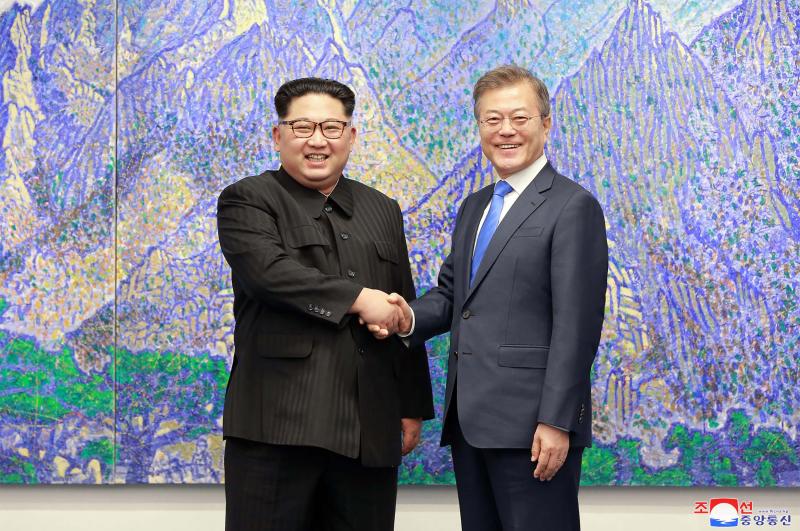North Korea says denuclearisation pledge not result of US-led sanctions
Sign up now: Get insights on Asia's fast-moving developments

North Korea's Kim Jong Un shaking hands with South Korean President Moon Jae In on April 27, 2018.
PHOTO: AFP/KCNA
SEOUL (REUTERS, BLOOMBERG) - North Korea said on Sunday (May 6) its intention to denuclearise, unveiled at a historic inter-Korean summit, was not the result of US-led sanctions and pressure, warning the US not to mislead public opinion.
Impoverished North Korea has been hit by a series of US-led international sanctions in recent years in a bid to rein in its nuclear and missile programmes.
North Korean leader Kim Jong Un and South Korean President Moon Jae In vowed "complete denuclearisation" of the Korean peninsula in the first inter-Korean summit in more than a decade on April 27, but the declaration did not include concrete steps to reach that goal.
The North's official KCNA news agency, citing a foreign ministry spokesman, said Washington was "misleading public opinion" by claiming the denuclearisation pledge was the result of sanctions and other pressure.
"Recently, the US is misleading the public opinion, arguing as if the DPRK's clarification of its intention for denuclearisation of the Korean peninsula made through the Panmunjom Declaration adopted at the historic North-South summit is the result of so-called sanctions and pressure," the spokesman said, referring to the acronym for North Korea's official name, the Democratic People's Republic of Korea.
"At the same time, it is making open remarks that it would not ease the sanctions and pressure until the DPRK gives up its nuclear weapons completely and also moving to aggravate the situation on the Korean Peninsula by deploying strategic assets on the peninsula and increasing its attempt to taking up 'human rights' issue against the DPRK."
Yonhap said the remarks appeared to be referring to the eight US F-22 stealth fighter jets sent to participate in joint annual South Korea-US military training.
It would not be conducive to resolving the issue of denuclearisation if Washington miscalculated North Korea's"peace-loving intention" as a sign of weakness and continued to pursue its pressure and military threats, KCNA said.
"This act cannot be construed otherwise than a dangerous attempt to ruin the hardly-won atmosphere of dialogue and bring the situation back to square one," it said.
The statement marks a rare criticism of Washington from the North in recent weeks, with the two countries preparing for an unprecedented summit between their leaders, reported South Korea's Yonhap news agency.
In a separate KCNA report, North Korea gave credit to Kim for the diplomatic breakthroughs, saying that his "boldness, patriotism and leadership" contributed to building the peace talks.
KCNA's missive follows US President Donald Trump's statement on Friday that a date and place have been set for his summit with Kim.
While official details haven't been released, South Korean newspapers have reported that the meeting will most likely take place in the third week of June in Singapore.
Trump told the National Rifle Association's annual convention in Dallas on Friday that he had toned down his rhetoric in anticipation of the talks after labelling Kim"Little Rocket Man" last year and threatening him with "fire and fury".
Separately, South Korean news agency Yonhap reported that Mike Pompeo, the new US Secretary of State who met with Kim more than a month ago, ruled out a Trump-Kim meeting at Panmunjom, the border village.
Trump is set to meet Moon in Washington on May 22, in advance of the planned historic summit between the leaders of the US and North Korea.
Moon said Trump deserved a Nobel Peace Prize for his efforts to end the standoff with the North.
The White House said that Trump's national security adviser, John Bolton, met his South Korean counterpart, Chung Eui Yong, on Friday and both said there were no plans to change the US-South Korea bilateral defence posture.
North and South Korea are technically still at war because their 1950-53 conflict ended in a truce, not a peace treaty. South Korea said US troops need to stay in the area even after a peace treaty is concluded to replace the armistice.
The United States stations 28,500 troops in South Korea, a legacy of the war.


